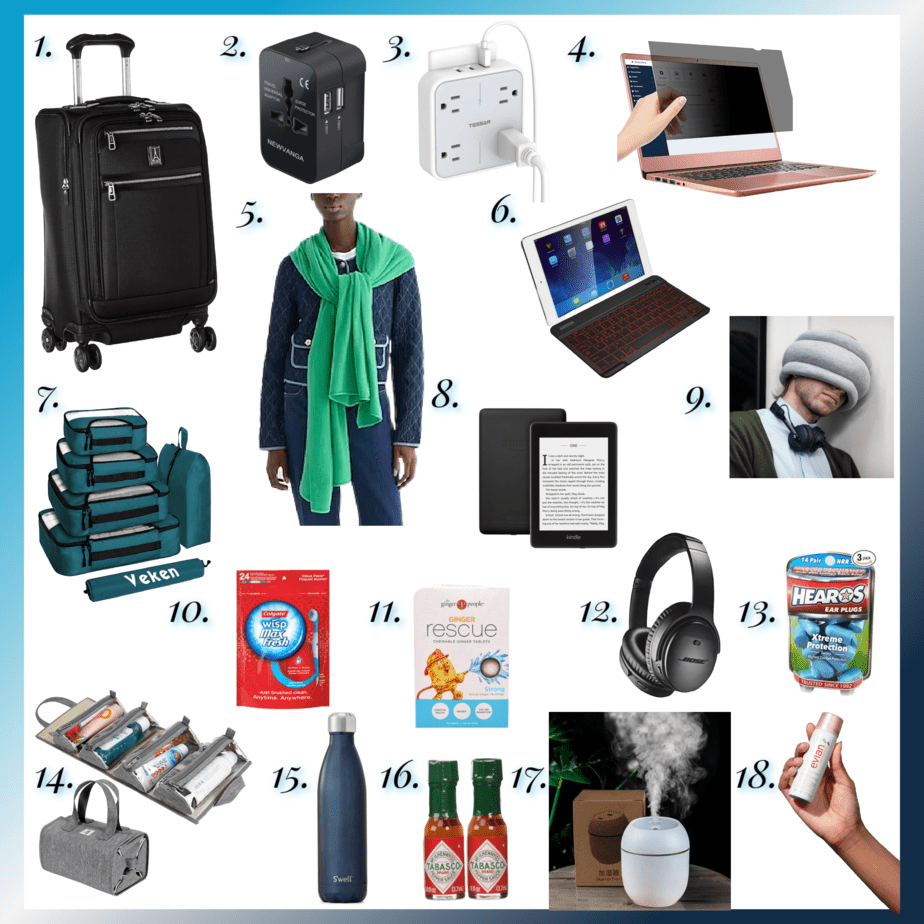Things to Do at Work to Prep For Your Vacation
This post may contain affiliate links and Corporette® may earn commissions for purchases made through links in this post. As an Amazon Associate, I earn from qualifying purchases.

It's been a while since we talked about actually taking vacations, but with Memorial Day almost upon us (yay!) and lots of people gearing up for big summer vacations, let's discuss. Readers, what do you do at work to prep for your vacation? Do you think there are different things to do to prep for your vacation if you're fully in-office, hybrid, or remote?
(Another question: Are there any positions or workplace dynamics in which you really just feel comfortable checking out completely for a week or more without significant prep — and what do you think those are? More senior, more junior, not customer-service oriented, etc…)
{related: we asked the readers: how many paid vacation days do you get every year?}
Things to Do at Work to Prep For Your Vacation
Some suggestions:
Plan, plan, plan. Know what's due before you leave, when you're gone, and when you return. Prioritize things based on the schedule, but also based on how much work you can get done, if needed, while on the plane or (heaven forbid) the vacation itself. For example: that fact-based project with a zillion binders, moving pieces, or many people involved in the decision chain? Get that one done at the office. That article you're writing — for which the research is done but the article is heavily in need of editing? — that's a great project for the plane, if it comes to that.
Let other people know that your planned vacation time is coming soon. This depends a lot on the dynamics of the office — I've done everything from emailing my superiors (and subordinates) to let them know it was coming up a week or two ahead of time, to leaving a travel guidebook on my office desk (as a silent reminder).
Leave your office well-prepared. If you're working on three or four different projects, leave a pile for each on your desk so that if a question comes up in your absence, your coworkers have at least a fighting chance of finding the answer themselves. Also, I've always left a printed sheet with my itinerary, my hotel information, my cell number (and my traveling companions' numbers), and anything else pertinent. You may want to even “schedule” a time each vacation day to answer emails and voicemails, so other people know when they can expect a response. (Obviously this depends on your seniority and on how many fires are going on at the office when you leave.)
{related: what to know about taking vacations alone}
Some more suggestions from the commenters on previous discussions about this:
- My coworkers and I try to make each others’ vacations a little easier by divvying up each other’s work while we’re out. So, if I were going on vacation next week, I would meet with my two coworkers and split my ongoing projects between them. For each project, they get the latest drafts (or instructions if there is no draft), the client contacts, and I tell the client to contact Coworker Jane with any questions or issues about their matter while I’m gone. When Coworker Jane takes her vacation, I reciprocate. Coworker Jane and I trade cell phone numbers for emergencies, but we rarely use them. This works so well for us that we can generally take an entire week-long vacation w/o a single call from the office. If you can work out this kind of shared-work arrangement with your colleagues, it’s a great way to make sure you don’t have to kill yourself trying to clear the desk entirely but can still really unplug when you take your vacation.
- I build an extra day when I return. We fly back in on Saturday so we can adjust to jet lag and do laundry, catch up on email, triage the inbox. If things got so bad on getting things in order before I left, I would consider building an extra day on the start of vacation, plan to take Friday off to adjust people to my time off. Finish things up at home to help transition out. But really, something always happens. People can survive without you. They don’t want to, but they can.
- I usually try to draft a quick note on each case/issue that might possibly come up and email them to anyone who might get involved. For example “The Smith case involves (subject), and nothing’s due until X, but client may call about Y.” Just so they’re not entirely lost if something does come up.
{related: do you repeat vacations, or try new vacation destinations?}
One lawyer had some great tips:
I’m a lawyer, so different but still similar issues with vacation – unpredictable deadlines, focus on client service, demanding bosses and colleagues.
I leave a detailed list of every matter that I’m working on if I’ll be out of the office for a week or more. I give it to my assistant, and it includes a short description of the matter, the status (i.e., letters have been sent, waiting for response), the external contacts who may call about the matter, and the internal contact person who can handle it while I’m away. I find it to be a helpful way of making sure I’m not missing anything, and helpful when I return so I can just pick up where I left off. My assistant likes it because she has something to say when a client calls (“Mrs. Emcsquared is out of town, but Mrs. Jones is aware of this matter – may I forward the call to her?”)
And I like to set aside a half hour each vacation day to clear out my e-mail. I don’t generally respond outside the firm; I just forward to my internal contact and let them respond. I hate coming back to a full e-mail box. Finally, try not to send any e-mail for 3-5 business hours before you leave town (meaning, if you leave at 6 am, don’t send e-mail after 3 pm the day before). The more e-mail you send, the more you get back…and if you do have to send an e-mail in that window, make sure it’s a complete and organized description of your conclusions and proposals, not just a “let’s talk about this” e-mail.
And while you’re on vacation – put your phone in the safe and turn off the ringer. Or switch off the e-mail synch function, or disable the e-mail notifications. I did this accidentally once, and have done it intentionally ever since. Truly worthwhile.
Readers, what things do you do at work to prep for your vacation?
These are some of the Corporette readers' favorite items for business travel…

Stock photo via Stencil.

I get so nervous about it I tend not to take vacations. Does anyone have any tips on how I can actually schedule them despite worrying the trip will be canceled or ruined by having to work on it?
One thing I’ve found useful is to put my out of office on my email and voicemail a few hours before I actually leave the office. Like clockwork, something “urgent” will come up when I’m trying to wrap things up and get out of the office, that person getting an out of office will help adjust expectations so I don’t have to drop everything and triage a response. Most of my close contacts at work know that I do this and will confirm that I’m actually there or not by IM, and I trust them to know the difference between “I want this right now,” and “This actually needs to be done right now!” So this is really more for people outside of my immediate working group.
A few things:
1) Set an all day outlook event for the duration you are away, no reminder, show as free, do not request responses. Send this to any of your key stakeholders when you are planning your trip. This will keep it fresh in their mind and they will know you have something coming up and will be out and have it in their calendar as a reminder
2) For internal emails a week out at the end of your signature put a note of your upcoming vacation plans. this will help people remember your upcoming awayness
3) For anything urgent that you are aware of get it done , acknowledge it wont be done till you are back, or set a plan in place for while you are away
4) Determine responsible folks while you are away.
4a) If you have direct reports its a great opportunity to develop their leadership capabilities. Formally assign someone as acting manager, or take a softer approach and assign specific areas to individuals. The most important part is to ensure they are empowered to make decisions
4b) if you have others in your same role spread the work around and be sure to do the same when it is time for their vacations.
I always take my phone and check emails once a day or so to keep it on pulse, but I keep a hard rule of if it can wait till im back I never reply.